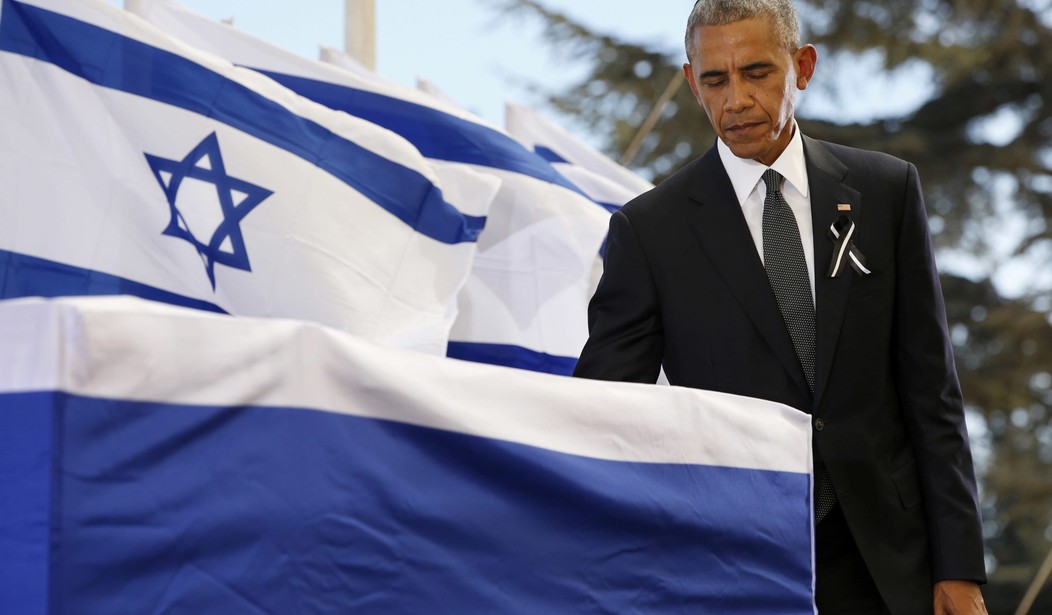The fallout continues as events develop to a climax during President Barack Obama’s last month in office. To recap what has transpired thus far, on Thursday, December 22, Egypt’s ambassador to the UN, sitting as a member of the 15-member Security Council, presented a surprise resolution for consideration condemning Israel for establishing “settlements” on disputed territory claimed by the Palestinian Arabs. Shortly after presenting the resolution, Egypt was persuaded to withdraw it from consideration sine die.
Immediately after the resolution was withdrawn, members of the current Likud-led Israeli government began to voice allegations that Obama and Secretary of State John Kerry had some secret involvement in the matter. Within a matter of hours, four other current members of the Security Council – New Zealand, Senegal, Malaysia, and Venezuela – had reissued the resolution for consideration, and pressed for a vote. On Friday, December 23, the resolution was passed by the Security Council by a vote of 14-0; the United States abstained, overturning decades of American policy regarding anti-Israel measures. The other ten members of the Council, aside from the four countries jointly presenting the resolution, that voted for it were Angola, Egypt, Japan, Spain, Ukraine, and Uruguay, as well as the permanent members, Russia, the United Kingdom, France, and China.
Israeli government sources insist that they have “iron-clad evidence” of American secret involvement in drafting the resolution, and specifically that Vice President Joseph Biden had personally applied pressure on Ukraine, still engaged in an on-again, off-again armed conflict with the Russian Federation, to go along with the vote. Ukraine’s current prime minister, Volodymyr Groysman, is Jewish.
Israeli Prime Minister Benjamin Netanyahu, in a scathing rebuke of the Security Council, has refused to accept the resolution or to act on it. He pointed out that this same Security Council has dithered and done nothing about the sputtering Syrian civil war, which has claimed 500,000 lives and sent waves of refugees fleeing into neighboring countries as well as farther afield into Europe, but instead has chosen to concentrate on the only stable parliamentary democracy in the region, Israel, vowing “consequences” for all those participating in the vote. Those consequences have begun to take shape over the last few days.
Israel’s first action was to recall immediately her ambassadors to New Zealand and Senegal. Simultaneously, Israel announced that it was “limiting” its diplomatic contacts with all of those other Council members with whom she has diplomatic relations, canceling any state visits by Israeli officials to those countries, or by any official from those countries to Israel. Accordingly, a planned state visit by Groysman has been cancelled. Israel will be reluctant to cut off diplomatic relations entirely with Britain, France, and Spain – all members of the European Union (though the UK voted in a referendum recently to withdraw from the Union) — both because the EU is Israel’s largest single trading partner, and also because of the significant Jewish populations of the UK and France. Israel has no current diplomatic relations with Malaysia and Venezuela.
In the meantime, a flurry of activity has erupted in the American Congress at a time which is normally a placid recess period. Amid bipartisan criticism of Obama’s knife-in-the back abstention, several Republican senators, including such diverse figures as Ted Cruz and John McCain, have called for defunding the UN in the wake of the resolution. By far the most important of these figures is Lindsey Graham, who chairs the Senate Appropriations Committee, which actually allocates the money for United States’ dues to the UN; Graham has promised to introduce a bill rescinding funding when the Senate reconvenes next month.
The resolution in question is actually a restatement, in large part, of an earlier resolution adopted by the Security Council in 1979, when the United States again abstained in the matter. To understand why and how this conflict over “settlements” has arisen, a brief historical review is in order.
In 1947, shortly after the defeat of Nazi Germany, Great Britain, severely strapped for cash and facing the dissolution of the British Empire, found that the territory then called Palestine, which had been awarded as a mandate of the League of Nations in the wake of the Great War of 1914-1918, proved to be literally ungovernable, as competing Jewish and Arab groups engaged in asymmetrical warfare with each other and the British authorities, and the country slid into chaos. Accordingly, Britain returned the mandate to the United Nations, as the successor to the now-defunct League, and a vote was taken to partition Palestine into a relatively small Jewish state, largely occupying the Mediterranean shore, southern Galil, and the Negev; a rather larger Arab state comprising the Golan, upper Galil, Yehuda and Shomron; and Jerusalem, which was to be administered as an international city under UN auspices, intended to belong to neither state.
The Jews accepted the plan; the Arabs roundly rejected it. In addition to the armed irregular Arab guerrillas already active in the country, Israel was simultaneously invaded by the combined armed forces of Egypt, Lebanon, Syria, and what was then called the Kingdom of Transjordan, with the goal of pushing the Jews into the sea. The Jewish population didn’t oblige, and when the dust settled and an armistice was signed in 1949, the new state of Israel controlled slightly more territory than she had been allocated in the original partition plan. Significant pieces of territory were occupied illegally, in defiance of the UN plan, by the surrounding states: Egypt held a part of the southern Mediterranean coast known ever after as the Gaza Strip (named for its principal town); Transjordan now straddled the Jordan River, occupying Yehuda, Shomron, and eastern Jerusalem (hence the name of the kingdom was changed to Jordan); and Syria held the Golan Heights.
So the situation simmered for 18 years, as Israel absorbed hundreds of thousands of displaced Jews from Europe and the surrounding Muslim world, and proceeded to build a modern parliamentary republic despite constant guerrilla harassment from the Arab-occupied territories. When Gamal Abdel Nasser, the charismatic president of Egypt, abruptly nationalized the Suez Canal in 1956, Israel joined with Britain and France to conduct the Sinai Campaign, intended to relieve terrorist pressure from the Gaza Strip and liberate and internationalize the Canal. This campaign, though initially successful, met with unremitting hostility on the part of the Eisenhower administration, and Israeli forces were obliged to withdraw from the Sinai Peninsula and Gaza Strip; a UN peacekeeping force was installed to keep the two sides apart.
In 1967, Nasser, now a Soviet client, entered into a political merger with Syria which became known as the United Arab Republic, and troops began to mass in the Sinai and along the Golan, a region from which the Syrian army had engaged in two decades of sporadic shelling and sniping against Israeli farmers in the valleys below. An entire generation of children grew up sleeping nightly in bomb shelters. As tensions mounted, Nasser demanded that the UN withdraw its troops from the Sinai, and then-Secretary General U Thant complied with the demand. Egyptian warships closed the Straits of Tiran, preventing shipping from entering or leaving Israel’s southern port of Eilat, at the same time as the still-nationalized Suez Canal was closed to Israeli shipping.
Israel responded to the imminent threat with a pre-emptive strike. After a series of lightning moves, a mere six days later Israeli troops had once again reached the Canal and taken the Golan from the Syrians. In the meantime, Jordan, which had joined in the fighting by shelling western Jerusalem, found itself dispossessed of eastern Jerusalem, Yehuda, and Shomron, shoved back across the Jordan River. Thus, the territory which had formerly been illegally occupied by the Arab states now came under Israeli military rule.
In an emergency session, the UN Security Council of the day met, and Resolution 242 was passed by the council. Crucial to subsequent developments, the resolution exists in two versions, both unfortunately considered official, one in English and the other in French. The English-language text calls for Israel to withdraw “from territories” occupied in the late war, whereas the French version reads des territoires. The presence of the definite article makes the French text interpretable as “from the territories,” i.e., all of them. Israel accepted the resolution, and offered the defeated Arabs land for peace; the offer was refused.
For several years, Israel held the territory unchanged and undeveloped, hoping that the surrounding Arab states would change their minds. Then, in the wake of the Yom Kippur War of 1973, the religious Zionist Gush Emunim movement began establishing settlements in the territories in the teeth of opposition from the Socialist-dominated government. When political scandals brought the Rabin government down and for the very first time the Socialists were defeated by Likud, bringing Menachem Begin to power, in 1977, settlement activity was strongly encouraged and subsidized by the government. It was this which led to the 1079 resolution and the first historic American abstention.
The immediate consequences of the resolution are three-fold: First, it gives a new lease on life to the boycott, divestment, and sanctions movement, by providing it with the cachet of international law. Secondly, it provides political cover for any political entity (such as the EU) that might be inclined to impose unilateral sanctions on Israel for defying it. And third, it just offers false hope to the Arab irredentists.
On December 28, John Kerry delivered remarks concerning what he considers his vision of a peaceful resolution of the Israeli-Palestinian conflict. The full speech can be viewed here. The crux of Kerry’s remarks is the assertion that a majority of both Israelis and Palestinians still favor a two-state solution. Is this assertion well founded?
The answer is both yes and no. In a recent poll reported by the Jerusalem Post, for example, 59% of Israelis and 51% of Palestinians were found to still favor a theoretical two-state solution, However, when the same sample was presented with a hypothetical peace plan which mirrors Kerry’s recommendations and prescriptions – broadly, mutual recognition, borders based on the 1949 armistice lines (pre-Six-Day War borders) with land swaps, establishment of a Palestinian capital in eastern Jerusalem and an Israeli capital in western Jerusalem, and the return of 100,000 Arab refugees to Israel proper – the results was very different: 46% of Israelis in general support such a plan, and only 39% of Palestinians.
Furthermore, the trend is away from approval of such an idea. The fastest growing segment of Israel’s Jewish population, religiously observant Jews, are steadfast against it (10% approval), while 34% of religious Muslims said they would support such a deal.
So Kerry’s vision, his mealy-mouthed justification for the abstention in the UN, is unrealistic and unworkable now, and only likely to become more so in any conceivable future. Whatever Obama’s and Kerry’s actual intent in this massive kiss-off of the only reliable American ally in the region, the one thing that won’t result from it is peace.









Join the conversation as a VIP Member